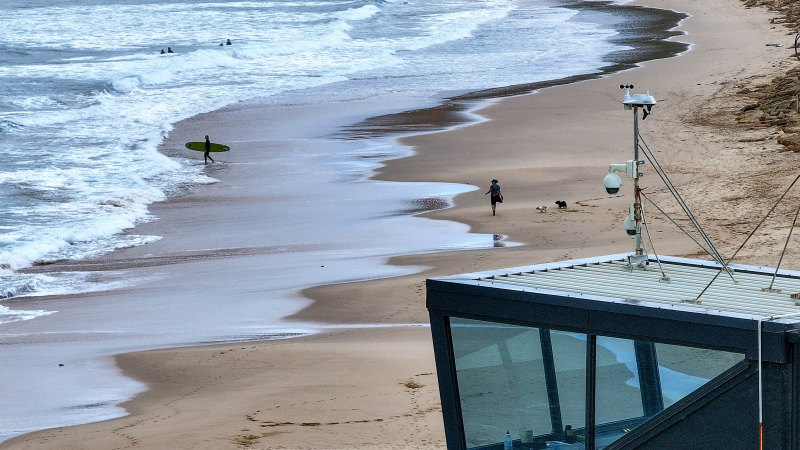Save articles for later
Add articles to your saved list and come back to them any time.
Ever get that feeling you are being watched? If you’re at the beach, you probably are.
Fixed cameras are proliferating along Australia’s coastline, capturing beachgoers who may not be aware they are being filmed and broadcast online.
Cams capturing footage of the beach on the Surf Coast. Credit: Joe Armao
Many of these cams, located in popular swimming and surfing spots, are operated by paid subscription or advertiser-supported websites, online retailers and even hotels.
The operation of these cams is not illegal, but cybersecurity and privacy experts say the rapid spread of technology has outpaced regulatory controls.
RMIT Centre for Cyber Security Research and Innovation director Matthew Warren said surf cams allowed people to view the conditions remotely, but many were being placed in locations where the public could also be seen.
“The assumption is that people do have a right to privacy but in reality that is not the case, whether it is being recorded by surf cams, influencers or even CCTV systems,” he said.
Some experts have also raised concerns about drones and the potential for privacy breaches. But Warren said the use of drones was more clearly defined with Civil Aviation Safety Authority rules stipulating a drone must be kept at least 30 metres from other people and cannot be flown in populous areas, which may include beaches.
Cams are generally positioned some distance from the water, making it difficult to identify individuals. However, some surfers say the onset of technology is changing the culture of their sport. There have also been incidents including fatal shark attacks that have been caught on surf cams and broadcast.
Surfer Andrew Blizzard, who lives at Jan Juc on the Surf Coast, said he was not concerned that the cams were breaching the privacy of surfers. But he argued proliferation of surf cams was a commercialisation of the natural environment and detracted from the mystique of surfing.
“I don’t see the benefit to the community,” he said. “People have been surfing here for 50 years without a camera.”
Surfer Andrew Blizzard at Jan Juc. Credit: Joe Armao
Blizzard said the number of surfers had increased markedly at Winkipop, which is part of the Bells Beach surfing recreation reserve, since a camera was installed nearby, and that he worried it would result in more inexperienced surfers taking to the water. “That’s an advanced, expert wave.”
Blizzard said he sometimes checked surf cams to monitor conditions, but insisted he did not support the cam at Winkipop.
Deakin University senior criminology lecturer Monique Mann said beachgoers may be unaware they were being filmed by surf cams – and even if people were, they had no choice to opt out.
“This is not closed circuit,” she said. “It’s live broadcasting to the internet.”
Academic Monique Mann on the beach in Torquay. Credit: Joe Armao
Mann, who is the Australian Privacy Foundation’s vice-chair, said the public should have stronger protections against being filmed by cams. She said the use of drones should also be better regulated on beaches.
“I don’t want people filming me in my bikini on the beach. I don’t know what they’re doing with that information.”
Mann co-wrote a report on the Winkipop surf cam, which is mounted on private property, for the Surfrider Foundation’s Surf Coast branch.
The report flagged privacy concerns and argued beachgoers may be unaware their images could be being recorded and broadcast online. It proposed three options at Winkipop: removing the camera, stronger regulation or further research.
Many surfers consider Bells Beach a sacred place for surfing. Credit: Joe Armao
But Swellnet, the surfing website that offers a subscription to the Winkipop cam, rejected the report’s findings. Swellnet accused the authors of failing to make contact before or after the publication of their paper.
A Swellnet statement said the academic paper conceded the business had not broken any laws. “Swellnet is currently considering its legal options to facilitate a retraction of the report,” the statement said.
Mann said she stood by her research and the values of academic freedom.
Surfrider Foundation Surf Coast Branch secretary Darren Noyes-Brown has campaigned against the surf cam at Winkipop, arguing the Bells Beach surfing recreation reserve is sacred and should be left alone.
He said few people went surfing to be livestreamed. “But a great many people do go surfing to get away from their worries and refresh themselves in nature,” Noyes-Brown said.
Noyes-Brown said the average person may not be able to identify someone using a surf cam, but regular surfers could identify each other from physical appearance and surfing style.
However, the Surf Rider Foundation Australia has no formal position on surf cams.
One of the biggest operators of surf cams in Australia, Surfline, did not respond to questions from The Sunday Age.
Great Ocean Road Coast and Parks Authority commercial and tourism director Andy Mathers said the authority took a “conservative and considered approach” to permitting CCTV cameras on the crown land it managed.
“Our priority is to address the operational requirements of emergency management agencies crucial to ensuring beach safety along the Great Ocean Road,” he said.
The authority had previously asked for a cam mounted on the Torquay Marine Rescue Service building to be taken down. The stream from the cam is broadcast on the internet. However, the authority confirmed the cam was now allowed to remain for water safety monitoring.
Cams monitoring the water at Torquay. Credit: Joe Armao
The concerns about surf cams come as the federal government prepares to introduce stronger privacy protections after a review of the Privacy Act.
Federal Attorney-General Mark Dreyfus this year announced the government had agreed or agreed in-principle to the review’s proposals, which included stronger protections for children. It also recommended removing an exemption from the Privacy Act for small businesses with an annual turnover of $3 million or less.
In a statement, the Office of the Australian Information Commissioner said it supported looming changes to tackle invasions of privacy.
Get the day’s breaking news, entertainment ideas and a long read to enjoy. Sign up to receive our Evening Edition newsletter.
Most Viewed in National
From our partners
Source: Read Full Article






